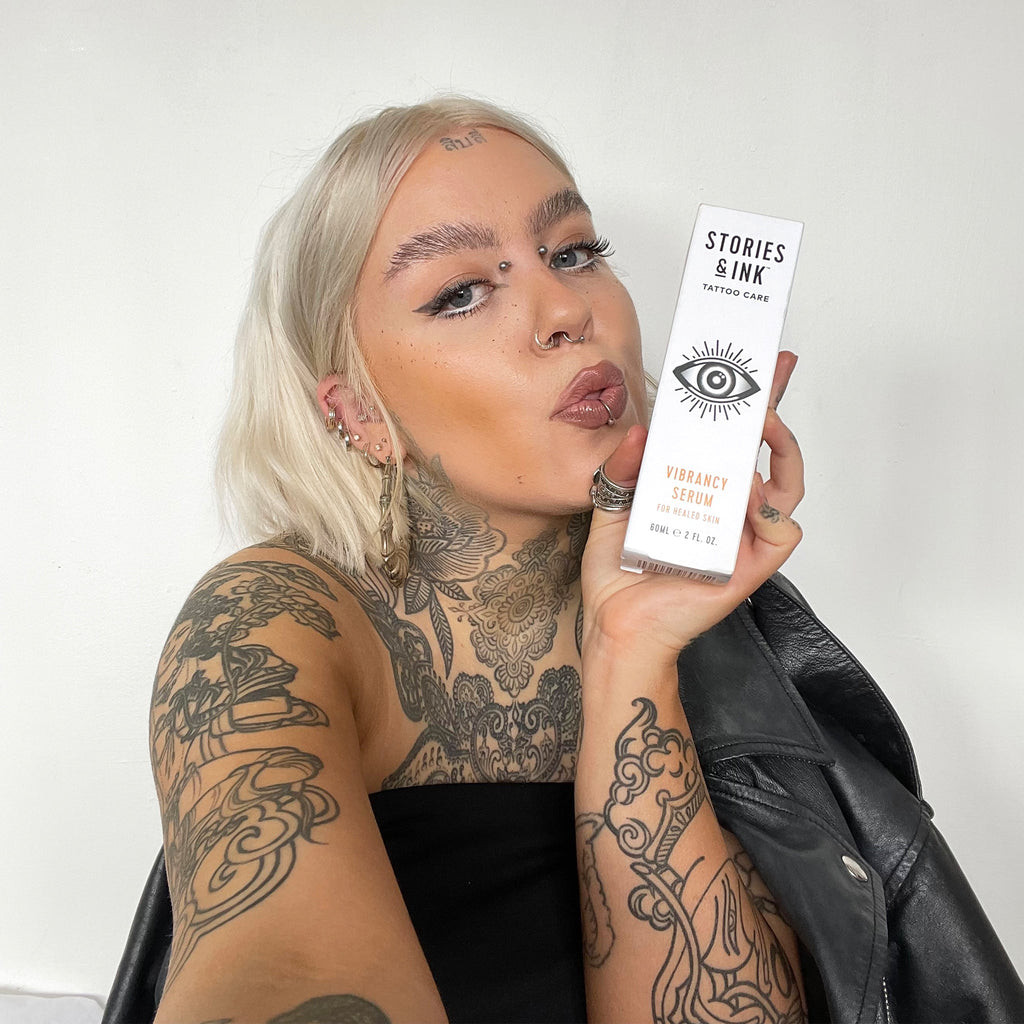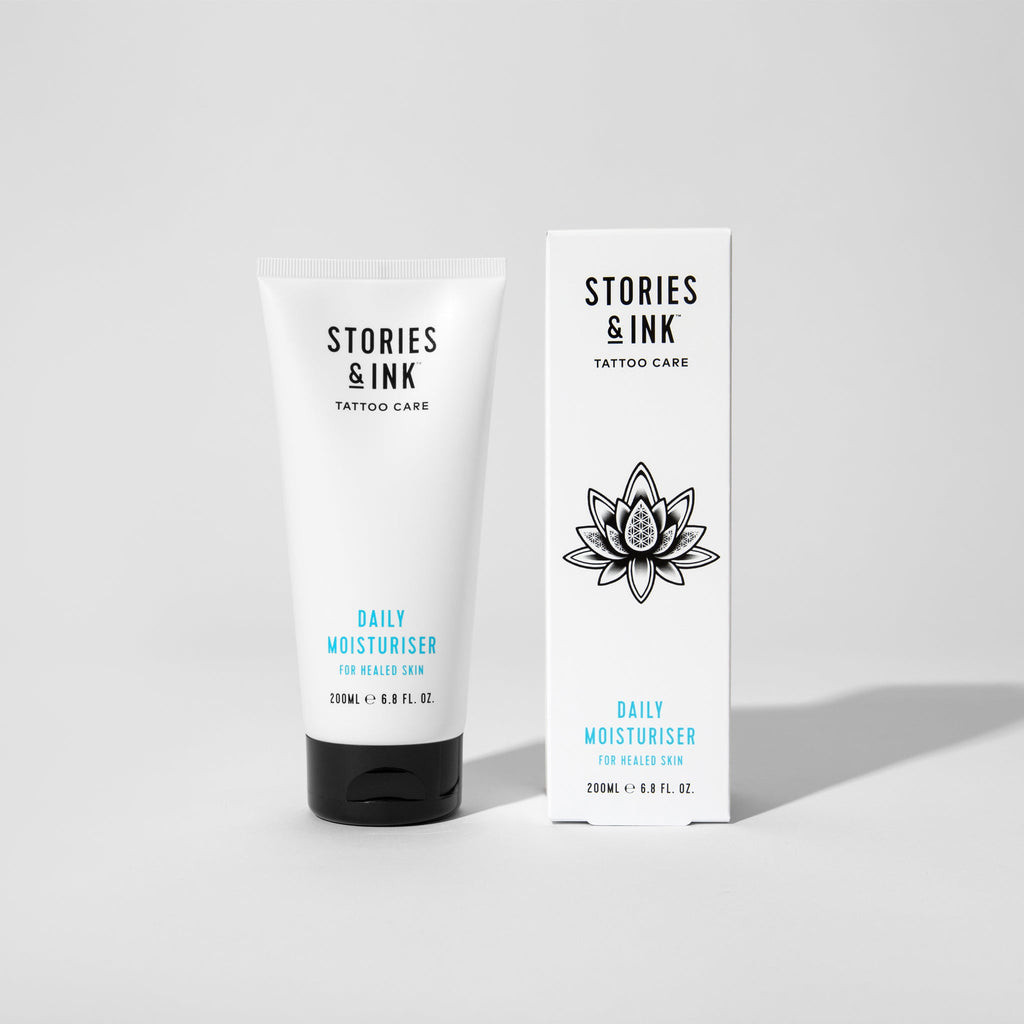Self tanning and tattoos require careful consideration. This article from tattooat.com explains everything you need to know about self tanning after getting a tattoo, including timing, potential risks, and tips for protecting your body art, ensuring the longevity and vibrancy of your inked skin with proper tattoo aftercare and sunless tanning techniques. Explore tattooat.com for more insights!
1. Can You Tattoo Over Fake Tan?
No, you cannot tattoo over fake tan. Sarah from @big.bird.tattoo emphasizes that fake tanning and tattoos don’t mix well, and it is essential to avoid applying fake tan to the area where you plan to get a tattoo. Clean, clear skin is a must for the tattoo appointment.
1.1 Why is fake tan a problem for tattooing?
Fake tan interferes with the design application because pigments in fake tan can hinder the stencil’s visibility and adhesion. Additionally, preparing for a tattoo often involves exfoliating the skin, which is the opposite of what you should do when maintaining a fake tan. Compromising the initial stages of tattooing can have a lasting impact on the tattoo’s appearance.
1.2 What should I do if I have fake tan on before my appointment?
Always remove as much fake tan as possible from the area to be tattooed before your appointment, because the skin will be cleaned again before the stencil is applied, but starting with a tan-free surface greatly aids the process. It’s far better to have a lighter patch of skin around the tattoo area than to risk compromising the tattoo’s quality.
2. What Types of Tan Should Be Avoided Before a Tattoo?
Various tanning methods can negatively affect the tattooing process. It’s best to avoid these tanning methods:
- Spray Tan
- Gradual Tan
- Sunbathing
- Sunbeds
2.1 Spray Tan
Spray tans, usually applied in salons, contain dihydroxyacetone (DHA). This chemical darkens the skin’s top layer within 24 hours after application, potentially interfering with the tattoo design and application, so avoid spray tans in the weeks leading up to your tattoo session.
2.2 Gradual Tan
Gradual tan products, often mixed with moisturizers, allow you to darken your skin tone gradually over a few days. While gentler than spray tans, they still leave a coating on the skin that can interfere with the tattooing process.
2.3 Sunbathing
Tattoo artists often refuse to work on sunburned skin, as tattooing over sunburn can be painful and can significantly impair the healing process. Moreover, tanning by sun exposure is a form of sun damage that your skin needs to recover from before getting a tattoo.
2.4 Sunbeds
Sunbeds, like natural sunlight, emit harmful UV rays that can burn the skin. Avoid sunbeds before your tattoo appointment to prevent skin damage. Sunbeds can also fade existing tattoos, especially those with colored ink.
3. How to Prep Your Skin Before a Tattoo
To properly prepare your skin for a tattoo, avoid sunless tanning products and direct sun exposure. Instead, embrace your natural complexion and focus on gentle exfoliation and moisturization.
3.1 Why is exfoliation important before a tattoo?
Exfoliation removes dead skin cells, providing a smoother surface for the tattoo artist to work on, ensuring better ink absorption and a clearer design. According to research from Portland State University’s Art Department, in July 2025, proper exfoliation provides Y, where Y is a clearer skin surface for tattooing, enhancing ink absorption and design clarity.
3.2 What kind of moisturizer should I use before a tattoo?
Use a high-quality, fragrance-free moisturizer to keep your skin hydrated, because well-moisturized skin is more receptive to the tattooing process and heals more effectively afterward.
4. Can I Wear Fake Tan After a Tattoo?
It’s best to avoid fake tanning for a few weeks after getting a new tattoo to allow it to heal properly. Chemicals in fake tan products can cause adverse reactions to the skin and the healing tattoo, potentially leading to infection or the need for touch-ups.
4.1 How long should I wait before fake tanning after a tattoo?
Wait at least 2 to 3 weeks after getting your tattoo before applying any fake tan or getting a spray tan, because this allows the tattoo to heal sufficiently.
4.2 What are the risks of fake tanning too soon after getting a tattoo?
Applying fake tan too soon can lead to skin reactions, infections, and the need for costly touch-ups. Proper tattoo aftercare is essential to prevent complications.
5. How to Fake Tan Around a New Tattoo
When your tattoo is fully healed, you can resume fake tanning while taking precautions to protect the tattoo itself.
5.1 What precautions should I take when fake tanning around a tattoo?
Moisturize the tattoo well before applying fake tan to create a barrier that prevents the tanning pigments from directly affecting the tattooed area. This helps maintain the ink’s vibrancy and prevents discoloration.
5.2 Does fake tan affect different tattoo ink colors differently?
Yes, colored ink might change with tanning pigments, making fake tan more suitable for blackwork tattoos. Hydrated skin takes on the tan better, ensuring a more even and natural-looking result.
6. Understanding the Risks of Tanning on New Tattoos
Applying self-tanner to a new tattoo can cause several complications. Understanding these risks can help you make informed decisions about your tattoo aftercare routine.
6.1 What are the immediate risks of applying self-tanner to a new tattoo?
Immediate risks include skin irritation, allergic reactions, and infection. Open wounds, such as those from a new tattoo, are more susceptible to bacterial and fungal infections.
6.2 How can self-tanner affect the appearance of a new tattoo?
Self-tanner can alter the color and clarity of a new tattoo. The chemicals in self-tanners can react with the tattoo ink, causing it to fade, discolor, or become uneven.
7. The Importance of Proper Tattoo Aftercare
Proper aftercare is essential for healing and preserving the quality of your new tattoo, because following a strict aftercare routine can minimize the risk of complications and ensure the tattoo remains vibrant and clear.
7.1 What are the basic steps for tattoo aftercare?
- Keep the Tattoo Clean
- Apply a Healing Ointment
- Avoid Direct Sunlight
- Stay Hydrated
7.2 How does moisturizing help in tattoo aftercare?
Moisturizing keeps the skin hydrated, promoting faster healing and preventing the tattoo from drying out and cracking. Use a fragrance-free, hypoallergenic moisturizer to avoid irritation.
8. Safe Tanning Alternatives for Tattoo Enthusiasts
If you’re concerned about the effects of self-tanners on your tattoos, several safe alternatives can help you achieve a sun-kissed glow without compromising your ink, because these alternatives allow you to maintain your skin’s radiance while protecting your tattoos.
8.1 What are some tattoo-friendly tanning options?
- Tanning Lotions
- Bronzers
- Tanning Beds
8.2 How do tanning lotions work?
Tanning lotions contain ingredients that gradually darken the skin over time. Choose lotions specifically formulated for sensitive skin to minimize the risk of irritation.
8.3 Are bronzers safe for use around tattoos?
Bronzers provide an instant tan without affecting the deeper layers of the skin. Apply bronzer carefully around your tattoos to avoid uneven coverage.
9. The Role of Tattoo Healing Balms in Protecting Your Ink
Tattoo healing balms play a crucial role in maintaining the vibrancy and clarity of your tattoo during the healing process, because these balms are specifically designed to protect and nourish the skin, promoting faster healing and preventing ink fading.
9.1 What ingredients should I look for in a tattoo healing balm?
- Shea Butter
- Vitamin E
- Aloe Vera
9.2 How do these ingredients benefit tattoo healing?
Shea butter moisturizes and protects the skin, vitamin E acts as an antioxidant to prevent damage, and aloe vera soothes and reduces inflammation, creating a protective barrier that helps the skin heal properly.
10. Expert Tips for Maintaining Tattoo Vibrancy
Maintaining the vibrancy of your tattoos involves a combination of proper skincare, sun protection, and lifestyle choices, so following these expert tips will ensure your tattoos remain as stunning as the day you got them.
10.1 What are the best practices for sun protection?
Apply a broad-spectrum sunscreen with a high SPF to protect your tattoos from UV rays. Sun exposure can cause the ink to fade and the skin to age prematurely.
10.2 How does hydration affect tattoo vibrancy?
Staying hydrated keeps your skin supple and healthy, which helps maintain the ink’s vibrancy. Drink plenty of water throughout the day to keep your skin moisturized from the inside out.
11. Understanding the Science Behind Tattoo Fading
Tattoo fading is a natural process influenced by various factors. Understanding these factors can help you take proactive measures to preserve your tattoo’s appearance.
11.1 What causes tattoo fading?
- Sun Exposure
- Aging
- Poor Aftercare
11.2 How does sun exposure contribute to tattoo fading?
UV rays break down the tattoo ink particles, causing them to fade over time. Regular sun protection is essential to prevent this.
11.3 Can aging affect tattoo vibrancy?
As the skin ages, it loses elasticity and collagen, which can cause the tattoo to appear less defined. Proper skincare can help mitigate these effects.
12. Debunking Common Myths About Tanning and Tattoos
Many misconceptions exist regarding tanning and tattoos. Separating fact from fiction can help you make informed decisions about your skincare routine.
12.1 Myth: Tanning beds are safer than natural sunlight.
Fact: Tanning beds emit harmful UV rays that can damage the skin and fade tattoos. They are not a safe alternative to natural sunlight.
12.2 Myth: All self-tanners are the same.
Fact: Self-tanners vary in ingredients and formulations. Choose products specifically designed for sensitive skin to minimize the risk of irritation.
13. Incorporating Tattoo-Friendly Products Into Your Skincare Routine
Choosing the right skincare products is essential for maintaining the health and appearance of your tattoos. Incorporating tattoo-friendly products into your daily routine can make a significant difference.
13.1 What types of cleansers are best for tattoos?
Use a mild, fragrance-free cleanser to gently clean your tattoos without stripping the skin of its natural oils.
13.2 Are there specific lotions designed for tattoos?
Yes, many lotions are specifically formulated to hydrate and protect tattooed skin. Look for products containing ingredients like shea butter, vitamin E, and aloe vera.
14. Protecting Your Tattoos During Outdoor Activities
If you enjoy spending time outdoors, taking extra precautions to protect your tattoos is essential. Whether you’re swimming, hiking, or simply lounging in the sun, these tips will help keep your tattoos looking their best.
14.1 How can I protect my tattoos while swimming?
Apply a waterproof sunscreen to your tattoos before swimming in chlorinated or salt water. Rinse the tattoos with fresh water after swimming to remove any chemicals or salt.
14.2 What should I do to protect my tattoos while hiking?
Wear protective clothing to shield your tattoos from the sun and potential abrasions. Apply sunscreen to any exposed areas.
15. The Impact of Lifestyle Choices on Tattoo Longevity
Your lifestyle choices can significantly impact the longevity and vibrancy of your tattoos, because making healthy choices can help preserve the appearance of your ink for years to come.
15.1 How does smoking affect tattoos?
Smoking reduces blood flow to the skin, which can impair healing and cause tattoos to fade more quickly. Quitting smoking can improve your skin’s health and prolong the life of your tattoos.
15.2 Does diet play a role in tattoo vibrancy?
A balanced diet rich in vitamins and antioxidants can promote healthy skin and help maintain the vibrancy of your tattoos.
16. Addressing Common Tattoo Healing Issues
Despite your best efforts, you may encounter some common issues during the tattoo healing process. Knowing how to address these issues can help prevent complications and ensure your tattoo heals properly.
16.1 What should I do if my tattoo becomes infected?
Seek medical attention immediately if you suspect your tattoo is infected. Signs of infection include redness, swelling, pain, and pus.
16.2 How can I prevent itching during tattoo healing?
Apply a fragrance-free moisturizer to the tattoo to keep the skin hydrated and prevent itching. Avoid scratching the tattoo, as this can damage the skin and increase the risk of infection.
17. The Future of Tattoo Aftercare Technology
The field of tattoo aftercare is constantly evolving, with new technologies and products emerging to improve the healing process and preserve tattoo vibrancy.
17.1 What are some emerging trends in tattoo aftercare?
- Laser Treatments
- Advanced Healing Balms
- Smart Tattoo Technology
17.2 How can laser treatments enhance tattoo appearance?
Laser treatments can help remove damaged skin cells and stimulate collagen production, improving the overall appearance and vibrancy of tattoos.
18. Exploring the Cultural Significance of Tattoos and Body Art
Tattoos have been a part of human culture for thousands of years, serving various purposes from religious symbols to expressions of personal identity. Understanding the cultural significance of tattoos can enrich your appreciation for this art form.
18.1 How have tattoos been used in different cultures throughout history?
Tattoos have been used for various purposes, including marking status, indicating tribal affiliation, and commemorating significant life events.
18.2 What role do tattoos play in modern society?
In modern society, tattoos are often used as a form of self-expression, allowing individuals to showcase their personality, beliefs, and experiences.
19. Choosing the Right Tattoo Artist for Your Needs
Selecting a skilled and experienced tattoo artist is crucial for achieving the desired results and ensuring a safe and comfortable experience, because a reputable artist will prioritize hygiene, use high-quality equipment, and work with you to create a design that meets your expectations.
19.1 What qualifications should I look for in a tattoo artist?
- Licensing and Certification
- Portfolio and Style
- Hygiene Practices
19.2 How can I assess an artist’s portfolio?
Review the artist’s portfolio to assess their skill level, style, and attention to detail. Look for examples of tattoos that are similar to what you have in mind.
20. Maximizing the Lifespan of Your Tattoos with the Right Products
Using the right products is essential for maximizing the lifespan and vibrancy of your tattoos, because these products help protect the skin from damage, promote healing, and prevent ink fading.
20.1 What types of sunscreen are best for tattoos?
Choose a broad-spectrum, water-resistant sunscreen with an SPF of 30 or higher. Apply generously and reapply every two hours, or more often if swimming or sweating.
20.2 How do moisturizing lotions help maintain tattoo vibrancy?
Moisturizing lotions keep the skin hydrated, which helps prevent the ink from fading and keeps the tattoo looking vibrant. Look for lotions containing ingredients like shea butter, vitamin E, and aloe vera.
FAQ: Self Tanning and Tattoos
1. Can I get a spray tan before getting a tattoo?
No, it’s best to avoid spray tans for a few weeks before your tattoo appointment.
2. How long should I wait to self tan after a new tattoo?
Wait at least 2 to 3 weeks after getting your tattoo before applying any self tanner.
3. What happens if I self tan over a new tattoo?
Self tanning over a new tattoo can cause skin irritation, allergic reactions, and potentially lead to infection.
4. Can self tanner fade my tattoo?
Yes, the chemicals in self tanner can react with tattoo ink, causing it to fade or discolor.
5. How can I protect my tattoo when self tanning?
Moisturize the tattoo well before applying self tanner to create a protective barrier.
6. Are tanning beds safe for tattoos?
No, tanning beds emit harmful UV rays that can damage the skin and fade tattoos.
7. What is the best way to tan with tattoos?
Use tattoo-friendly tanning lotions or bronzers, and always protect your tattoos with sunscreen.
8. Can I use tattoo healing balm after self tanning?
Yes, apply tattoo healing balm after self tanning to keep the skin moisturized and protected.
9. How does sun exposure affect tattoos?
Sun exposure can cause tattoos to fade and the skin to age prematurely. Always use sunscreen.
10. What ingredients should I look for in tattoo aftercare products?
Look for ingredients like shea butter, vitamin E, and aloe vera, which moisturize and protect the skin.
Ready to explore the world of tattoos? Visit tattooat.com for a vast array of tattoo designs, talented artists, and essential knowledge to guide you through your tattoo journey! Find inspiration, connect with professionals, and learn everything you need to know about tattoos.
Address: 1825 SW Broadway, Portland, OR 97201, United States
Phone: +1 (503) 725-3000
Website: tattooat.com
 Arm tattoo
Arm tattoo
 Moisturized tattoo
Moisturized tattoo
